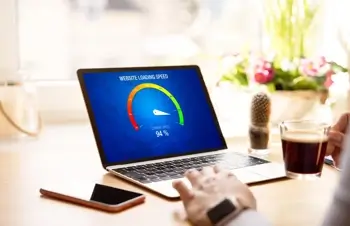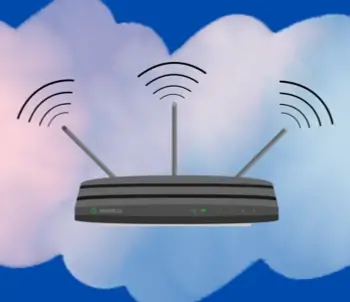What Is a Fast Internet Speed?
For many, fast Internet is simply something we've come to expect. It's bothersome when we get those pesky, spinning buffering circles when trying to stream our favorite shows or movies. Internet speed has never been more critical, whether streaming, browsing on your computer, online gaming, or making Zoom calls. In this article, learn about Internet speed, what network speed and Mbps are required for different activities, and several ways to increase your speed.
What is Internet speed?

Internet speed is the data transfer rate between your device and the internet. Network speed is typically measured in megabits per second (Mbps) or gigabits per second (Gbps), though gigabit Internet speed is much faster. Internet speed affects how quickly you can perform any activity online – browsing websites, streaming videos, downloading files, playing online games, and more.
There are two main Internet speed types: download and upload. Download speed refers to how fast you can receive data from the Internet, such as when you watch a video on YouTube or open an email attachment. Upload speed refers to how quickly you can send data to the Internet, like when you post a photo on Instagram or add an attachment to an email message.
What affects Internet speed?
Various factors affect your connection speed, including your Internet service provider (ISP), location, and type of connection. The most common types of Internet connections include DSL, cable, fiber-optic, and satellite. Fiber internet is the fastest and most reliable, followed by cable and DSL. On the other hand, satellite Internet is the slowest and most susceptible to latency issues.
The number of devices connected to your network, the type of activities you engage in, and your Internet plan also affect your Internet speed. For example, streaming HD video content or playing online games require faster Internet speeds than browsing the web or sending emails. The more activities you try to do at once, the faster your Internet must be.
Recommended Internet speeds
The definition of "fast" Internet may be subjective, but one thing's certain - it's all about efficiency. Whether streaming your favorite TV show, working from home, or simply browsing the web, "fast" Internet is essential for seamless online experiences. While some experts suggest that anything over 100 Mbps is considered fast Internet Mbps, it ultimately depends on your specific needs and the number of devices you plan to use simultaneously.
Here are some recommended good Internet speeds in Mbps based on the tasks you perform.
| Action | Recommended speed | Notes |
|---|---|---|
| Checking emails and browsing websites | 1-5 Mbps | Because these activities are basic, they generally require little speed. |
| Making video calls | 3 Mbps or higher | Seamless video conferencing requires slightly higher speeds, but 3Mbps is generally enough. If you share your Internet connection with others, however, you may need a faster connection. |
| Streaming videos | 5-100 Mbps | The resolution you need for streaming depends on the resolution of the video, but you can stream some videos with as little as 5 Mbps. |
| Playing online games | 50-100 Mbps | Because online games require no lag and solid connections, 50-100 Mbps works best. |
| One or more of the above simultaneously | 200 Mbps+ | Doing multiple activities on the same connection requires faster speeds. |
Why is fast Internet important?
With our lives increasingly depending on the Internet, a fast Internet connection has become necessary in our daily routines. Therefore, these are some of the ways faster Internet can benefit you:
- Efficient communication - Fast Internet speeds enable efficient communication through video conferencing, emails, instant messaging, and other online communication channels. This is particularly important for remote work, online learning, and connecting with friends and family.
- Streaming and entertainment - With fast Internet speeds, you can enjoy streaming high-quality video content, music, and games without buffering or lagging.
- Productivity - Fast speeds help increase productivity by enabling quick access to cloud-based tools and software as well as faster download and upload times for files.
- E-commerce - Online shopping is growing rapidly, and quick Internet speeds make it easier to browse and purchase products online.
- Innovation - Quality speeds are essential for research and development, which require testing and implementing new technologies. These include artificial intelligence, machine learning, and virtual reality.
In short, fast Internet is essential for staying connected, productive, and competitive in today's digital world.
How to check Internet speed

You can use the Internet Speed Test to test your Internet speed, which measures your download and upload speeds. This tool and others like it are easy to use. They can help you diagnose issues with your Internet performance or compare different ISPs or plans.
How to get faster Internet speed
Your Internet speed depends on various factors, such as your Internet service provider (ISP), type of connection (fiber, cable, DSL, satellite, etc.), location, device, router, network traffic, and more. There's no one-size-fits-all solution for improving your Internet speed, but if you need faster speeds, consider these tips to try and improve your Internet.
- Upgrade your plan or choose an ISP that offers a plan that suits your needs and budget.
- Use a reliable and secure connection type, such as a wired connection.
- Place your router in a central location with minimal interference. Move it away from walls and closer to the devices that you use most often. If that doesn't significantly increase speed, consider upgrading to a new modem and router.
- Update your device and router software regularly.
- Limit the number of devices you use at once. Avoid using multiple devices or applications at the same time. Also, take account of all the smart devices you have in your house that could be using up valuable bandwidth on your network. You might not realize it, but your smart thermometer, Ring doorbell, and smart refrigerator all take up bandwidth and can slow down your connection.
- Improve your network. Consider using a network extender or adjusting your router settings to optimize performance.
Is gigabit Internet worth it?
It's easy to believe that faster speeds are automatically superior. In fact, gigabit Internet speed, which refers to connections 1000 Mbps and up, is now advertised to home Internet customers by most providers. However, be aware that most average Internet users would never have use for it; gigabit Internet is generally faster than most people need and significantly more expensive.
If you use a lot of bandwidth regularly, a gigabit plan might make sense for you. Here are some activities that could benefit from a faster gigabit plan:
- Sharing WiFi with many roommates
- Streaming video in 4K
- Uploading large files on a regular basis
- Livestreaming
On the other hand, if you spend most of your time browsing webpages, streaming in HD, and making video calls, you probably don’t need gigabit Internet.
Fast internet speed is essential for staying connected, productive, and competitive in today's digital world. While the definition of fast Internet speed may vary depending on your needs and usage, a speed of 200 Mbps or higher is generally considered fast. If you're not getting the Internet speed you need, try upgrading your plan, using a wired connection, limiting the number of devices on the network, or optimizing your network. These tips allow you to enjoy faster Internet speeds and a more seamless online experience.